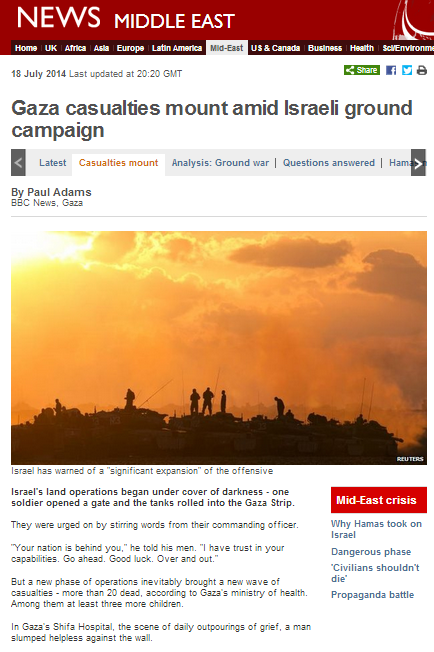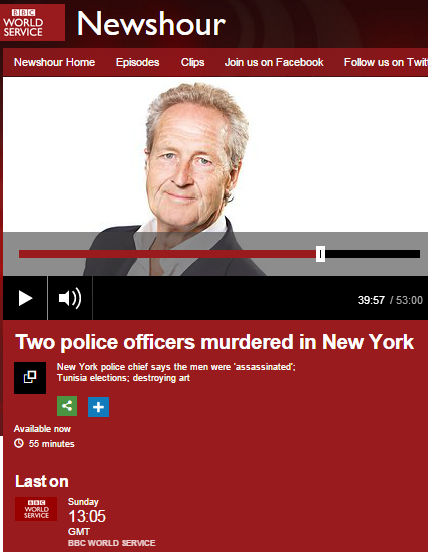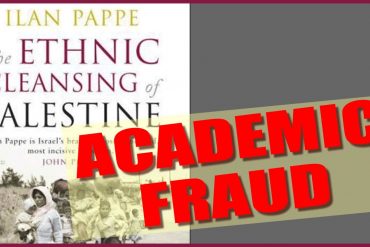As has been noted here previously, the BBC’s coverage of the recent Cairo donor conference aimed at securing funding for reconstruction in the Gaza Strip was quite extensive with the scene set by Yolande Knell on October 11th and a very partial representation of the topic appearing on the BBC News website on October 12th.
In addition to that, radio audiences heard a long item on the October 12th edition of the BBC World Service radio programme ‘Newshour’ (available here from 00:50 to 09:30) which recycled a previously aired item by Yolande Knell as well as including contributions from Orla Guerin in Cairo and the partisan UNRWA spokesman Chris Gunness.
In that programme presenter James Menendez twice states that “Hamas controls Gaza” whilst – confusingly for listeners – Orla Guerin describes a “fragile unity government which is supposed to be in place”. No effort is made to properly clarify the situation for audiences.
Neither is any effort made to inform listeners that the reason Israel imposes border restrictions on the Gaza Strip is the years of terrorism against Israeli civilians perpetrated by Hamas and other terrorist organisations based there and so listeners hear the following context-free statements from Guerin.
“…but the Israeli blockade of Gaza remains in place. Now that is a blockade by air, land and sea. It is Israel which decides which trucks and how many and carrying what goods are allowed in and out of Gaza. There are serious concerns being expressed by aid agencies about whether or not Israel will allow enough construction materials in. A temporary mechanism has been agreed and that will involve monitoring by the United Nations but they are literally almost at the level of counting the grains of sand going in and out of Gaza and there are serious fears that the volume of cement and construction materials that would be required will simply not be allowed in. Israel of course views cement as a dual-use item and it has been used by Hamas to build tunnels right out of Gaza under the ground into Israeli territory, so cement is particularly carefully monitored.”
The BBC has shown no interest to date in carrying out any serious reporting on the topic of Hamas’ misappropriation of the building supplies previously allowed into the Gaza Strip or the related – and very serious – subject of the accountability of the aid agencies and international bodies which were supposed to be supervising and guaranteeing the construction projects for which those materials were intended. With funds supplied, among others, by tax-payers in the West now scheduled for the reconstruction of housing in the Gaza Strip, those tax-payers might actually have been interested to hear how this latest “temporary mechanism” intended to prevent building supplies being used for the purposes of terror (which would of course eventually result in yet more conflict and further destruction of structures their taxes have paid for) is actually any different – and more efficient – than the previous failed one.
Audiences would also of course have benefited from information on the topic of why their governments are prepared to commit vast amounts of money to the reconstruction of a territory in which the government which supposedly runs it is unable to compete with terrorist-run militias funded and backed by foreign governments such as Iran and Qatar and why no demand has been made to disarm those terrorist organisations in order to prevent further hostilities and destruction.
But as Menendez’s final interview in this programme shows, its aim is not to provide BBC audiences with accurate and impartial information which would enable them to reach a comprehensive understanding of this particular “international issue“, but to promote the agenda of those supporting the Hamas campaign to lift border restrictions. One of the major players in that long-standing campaign is of course the highly politicized UNRWA and its spokesman Chris Gunness (who, readers may recall, was instrumental in the BBC’s revision of an article concerning casualty figures in the Gaza Strip) is given a three and a half minute long unchallenged platform for that purpose.
Gunness: “But let’s be clear: this mechanism is not a substitute for lifting the blockade. There is little point in reconstructing Gaza if the world refuses to allow Gaza to trade. Otherwise we’re gonna have people in lovely new houses but completely aid-dependent, which is why we say the blockade must be lifted, Gaza must be allowed to trade, to export, and the natural export markets of Gaza is…are…the West Bank and that’s what we need to see first of all.”
Menendez makes no attempt to point out to audiences that – contrary to the impression they will have received from Gunness, exports do leave the Gaza Strip. He also makes no attempt to challenge the following over-vehement protestations from Gunness.
“Well I have to be honest here and say that UNRWA has been taking materials – building materials – into Gaza for years and there is no evidence whatsoever that one grain of sand that UNRWA has taken into Gaza has ever been stolen or expropriated by any organization, least of all the militant organization. So we have a proven track record and I can speak for UNRWA and certainly we are able to get building materials into Gaza and for it not to be subverted or taken by any group and certainly not any militant group.”
Menedez does not raise the question of how an organization which could not prevent its aid being stolen or missiles being stored in and fired from its schools by terrorists is in a position to guarantee anything. He passes up on the opportunity to ask Gunness why sacks of UNRWA materials were discovered inside tunnels during the recent conflict.
Since July augmented context-free amplification of Hamas’ demands to lift border restrictions imposed by Egypt and Israel in response to the activities of that terror organisation and others has been all too evident in BBC reporting. The promotion of UNRWA’s political campaigning on that issue is also by no means new for the BBC. As we see in this edition of ‘Newshour’, that editorial policy continues.




